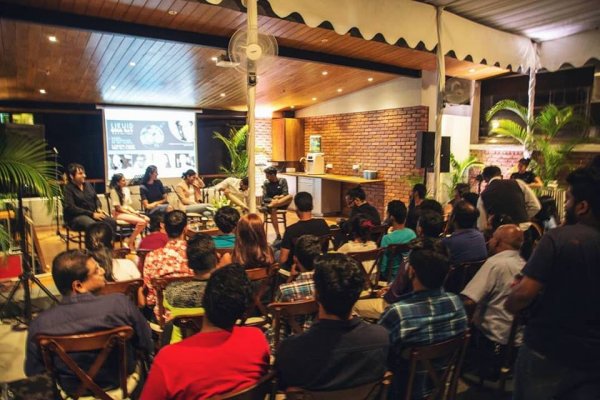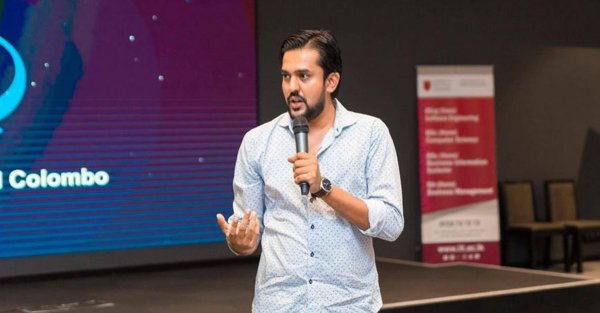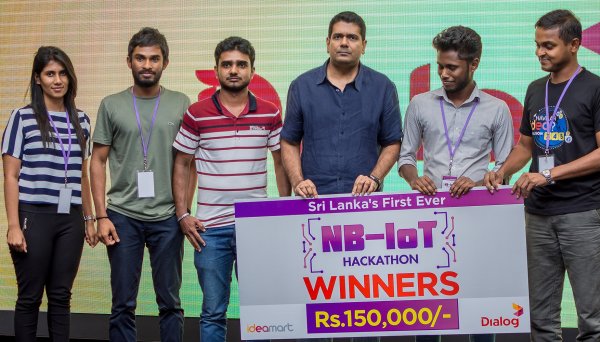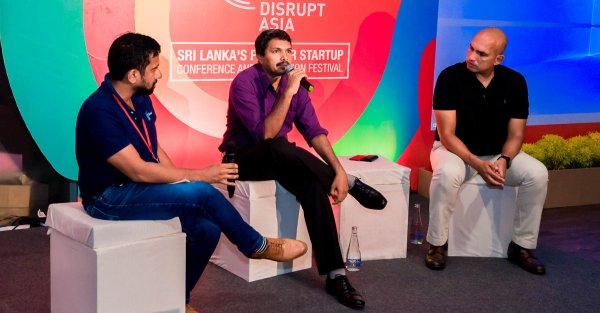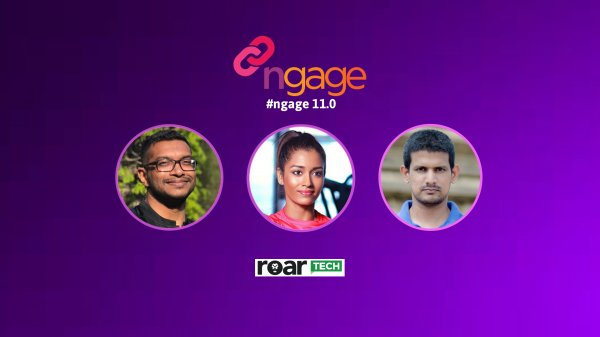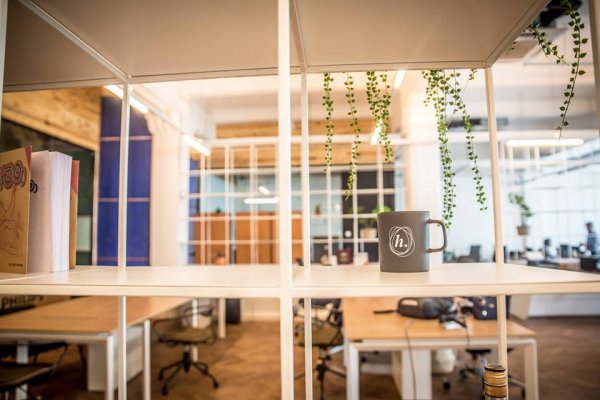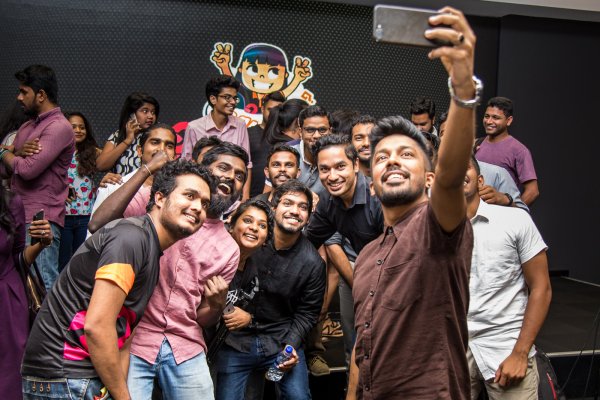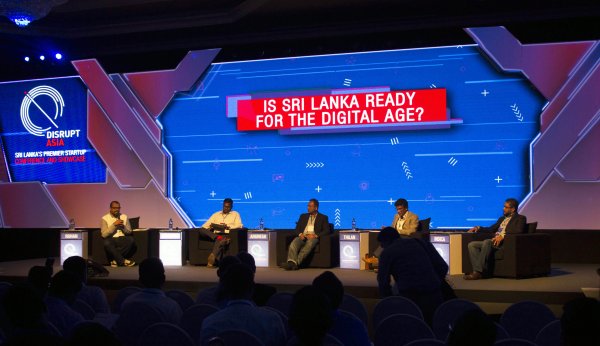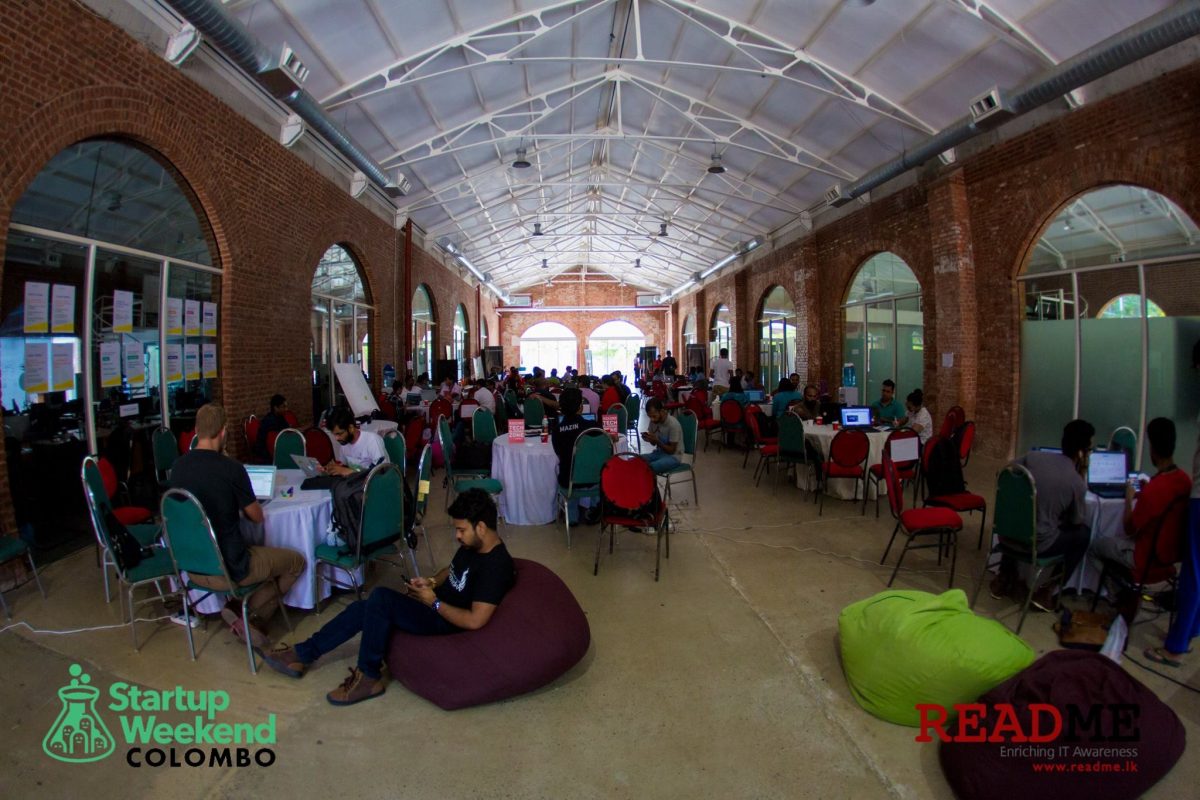
Startup Weekend is one of the largest globally organised events for entrepreneurs learning the basics of startup creation. It is a sort of grassroots movement by the Techstars ecosystem, with over 1,800 events organised in over 150 countries around the world, resulting in over 2 billion dollars raised and over 750 companies accelerated. It’s a 54-hour intensive creative session that helps prospective founders understand and experience the nature of the startup industry. Mentors and coaches guide the participants through the idea validation and pitching processes, making it a pretty good opportunity for learning.
The Colombo edition of Startup Weekend happened over October 7 to 9 at Trace Expert City, and had about 80 people taking part. Quite a large percentage of those arriving were young. According to the organisers, about 50% of them were students while the rest were professionals. Most of the participants were in their early 20s, with only a few brave souls over the age of 30 taking part. According to Anurag Maloo, the regional manager of Techstars, this was the case at most of the events happening on the sub-continent ‒ the average age is 26. At least 3 of the 14 teams eventually formed during the weekend were students from the Edulink campus, who appear to have an entrepreneurship programme.
The Weekend Begins
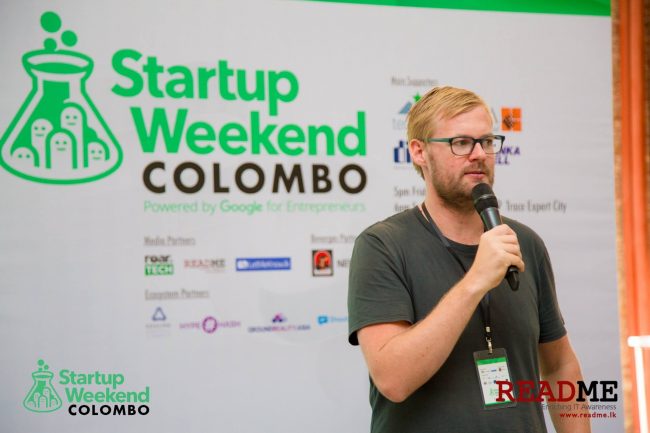
Andrew Hyde addressing everyone. Picture Courtesy: ReadMe
Friday evening was when the excitement began, with all the participants coming in, registering, and meeting each other for the first time. There were over 100 signups that day. Following the registration, there were speeches welcoming the participants, and ice-breaking and warming up sessions conducted by Andrew Hyde, founder of Startup Weekend. Andrew got people moving around, pulling them out of their comfort zones and up in front of everyone with little to no preparation. It was just a taste of things to come.
The participants then got to throw around the ideas they came in with and see who would take a bite. There were about 25 ideas on the board on the first day, and they’d spend the night organising themselves around the ideas they liked, forming teams, discussing game plans, and taking an inventory of skills. A portion of the participants came in with their own teams, but the rest of them would form their own teams or join existing ones.
There was a mix of skill sets present at the event. The majority of those gathered were from an IT background, but there were also mechanical engineers, accountants, legal professionals, and educationists present.
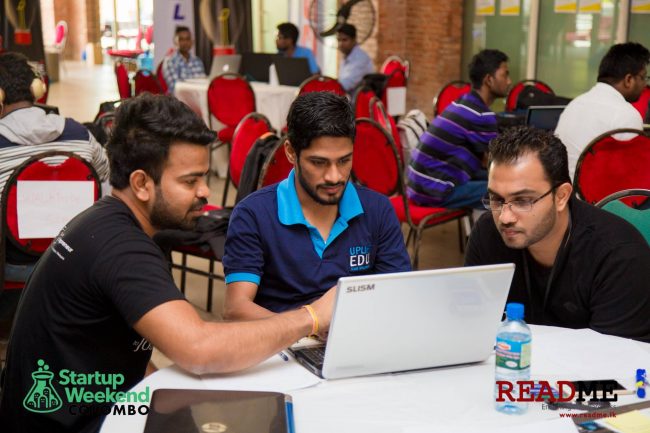
Mentors helping the teams. Picture Courtesy: ReadMe
The following day the excitement had settled as the participants dug in for the long run and started refining their ideas. The teams spent time with their mentors, refining ideas and working on validation. There was a notable list of coaches and mentors from the Sri Lankan startup industry available to help the teams. By this time, there were around 80 remaining from the original 100 registrants. The ideas being worked on were pared down to 14, from the original 25. The whole process was organic enough for a hardcore vegan.
The Final Sprint
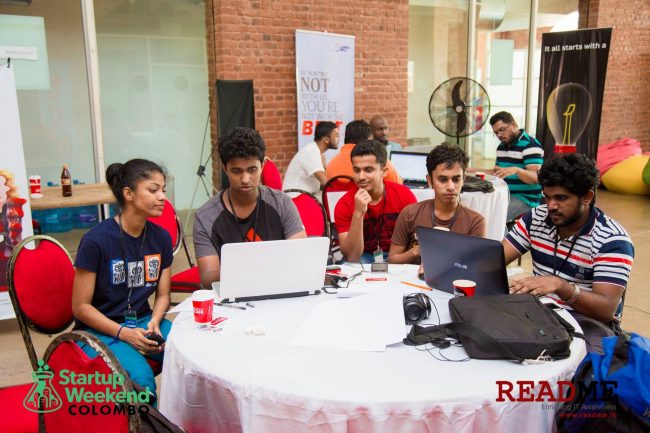
Participants gathered in teams. Picture Courtesy: ReadMe
The third day was the final stage of the marathon. Teams had settled into a steady pace, getting themselves ready for the final sprint. There was practically a caffeine haze around the whole place, but everyone was remarkably cheerful. There didn’t seem to be much nerves, which one would think to expect from a competition winding up. Everyone looked to be having fun. We put it down to youthful enthusiasm, tolerance for late nights, and a lack of ennui that could only be explained by the atmosphere of the whole place. Or candy. There was a lot of candy.
The venue was conducive to this kind of activity, as well ‒ an open floor with high ceilings, exposed air ducts, and brick walls gave everything an industrial revolution kind of vibe, just with wifi. There were bean bags, banquet chairs, and coffee-stained table cloths with laptops of all sizes on them. You’d usually tend to find a few tired individuals hugging the bean bags for a quick shuteye, but by the last day, everyone was pretty alert as they rushed the get their tech and presentations ready for the final pitch.
Just before lunch, the teams were called in to do a practice pitch so that the coaches and mentors could give them feedback to improve their chances before they met the judges. A diet of yellow rice, moju and a bunch of other curries fortified the teams in preparation for the pitches.
Pitch Perfect
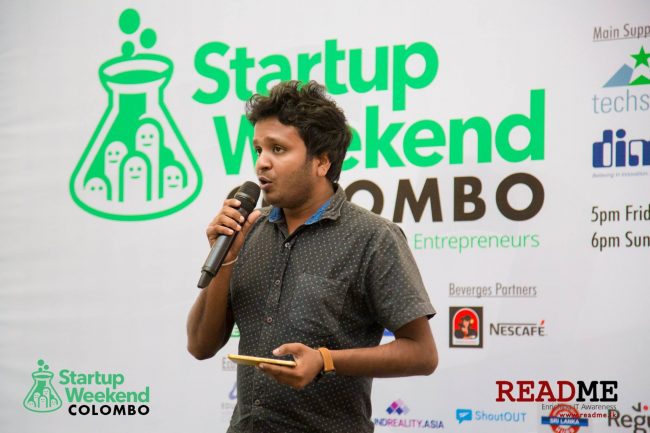
Pitching the judges. Picture Courtesy: ReadMe
Each team got five minutes to pitch the judges, and three minutes to answer questions from them. They got the mic, a projector for their laptop, and a chance to show off their demo if they had one.
A weekend wasn’t quite long enough to come up with a full-scale working project, but that wasn’t the purpose of the event anyway. The teams were to come up with a concept that had potential to scale, and was actually viable in today’s market. The judges would grill the teams to make sure they’d done their homework and investigated the market to the best of their abilities.
The judges present had plenty of experience in business and in the startup industry:
Lahiru Pathmalal – CEO of Takas
Shahani Marcus – CEO of Emojot
Mangala Karunanayake – CEO of Calcey Technologies
Gahanath Pandithage – CEO DIMO
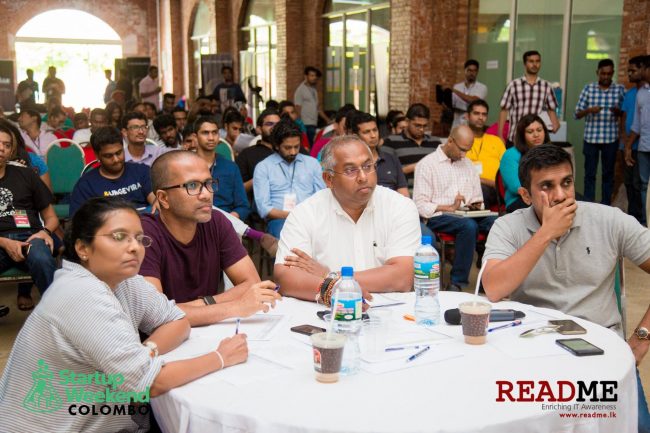
The judges. Picture Courtesy: ReadMe
At the end of the three days, there were 14 teams with startup concepts, ready to present to the judges.
1. Tellon
A platform for high-quality idea validation. It is used to get feedback on an idea from a target demographic. The platform filters the audience depending on criteria for evaluation.
2. Twinkle Dream
A cloud-based wedding management application that has budget management modules, to-do lists, and planners. It will be available as a web application, and then as a mobile app.
3. Techies Lanka
A community-based delivery platform. Someone who is traveling somewhere inputs the path into the app, and the algorithm matches it to someone who wants a delivery done on that route.
4. Eramaas
Expert financial support scaled for companies of different sizes. The hours of work and the prices are at different levels depending on a client’s needs.
5. Colombo Coding Camp
A coding boot camp for non-coders and coders to catch up with the requirements of the company they are working with. Classes will be on site and later, virtually conducted.
6. Team Lisa
An app called Salonify that allows users to make salon appointments online, choosing from a variety of salons on the list. Payments can be made through the app.
7. Save Lives
An Uber-like model for ambulance services. Ambulances from governmental agencies and private ones can be booked through a common platform.
8. WeddingBook
A wishlist platform for weddings. A wishlist is shared by the couple and well-wishers can use the platform to purchase gifts through partnering merchants.
9. Quick Change App
An app that collects spare change as points. A merchant who has no change will use the app to transfer points instead. The points are redeemable or transferable.
10. Walking School
An app that serves as a personal learning assistant. It helps students study for exams and is localised for language.
11. CC-Art
Online platform for designers and clients looking for work done. Graphic designers and web designers can use the platform to sell pre-designed pieces.
12. CookGym
A meal-tracking, and calorie-counter app. The app also suggests recipes based on what ingredients you have. Localised for Sri Lankan recipes.
13. Pepper Spray
A platform where users can report harassment or criminal activity in an area. The app warns users about who enters an area with several reports.
14. Know Your Ride
Platform to predict automobile component failure, using big data and machine learning. An IoT dongle/device collects the data from the car.
The pitches were of varying degrees of fluency and skill, but always full of enthusiasm. Every team gave the impression that they were fully behind their product. It was almost as if they’d been working on it for months. It was fascinating to see how far the concepts had developed since day one.
And The Winner Is…
All the teams worked really hard, but in the end, there could be only one winner. These were the judges choices:
2nd Runner Up – Colombo Coding Camp
1st Runner Up – Techies Lanka
Winner – Pepper Spray
The judges also gave special recognition to Team Lisa for having one of the easiest scalable ideas out there.
There’s no prize money for the winners, but they do get recognition for winning the competition, the chance to meet investors, and build lasting relationships. According to the organisers, about 12% of those taking part will stick with their teams and the ideas they came up with at the weekend. That’s a pretty good percentage. The winners also get Crowd Island services free of charge, if they develop their idea.
The prime takeaway for the participants at the Startup Weekend, however, is the experience, and the relationships they build through 54 hours of working together. The time participants spend working together causes a shift in their way of thinking, and puts them on the path to entrepreneurship. As Lahiru Pathmalal told the teams at the end of the event, every pitch made by them was better than his pitch, the first time he tried to raise funds. That’s worth the effort.
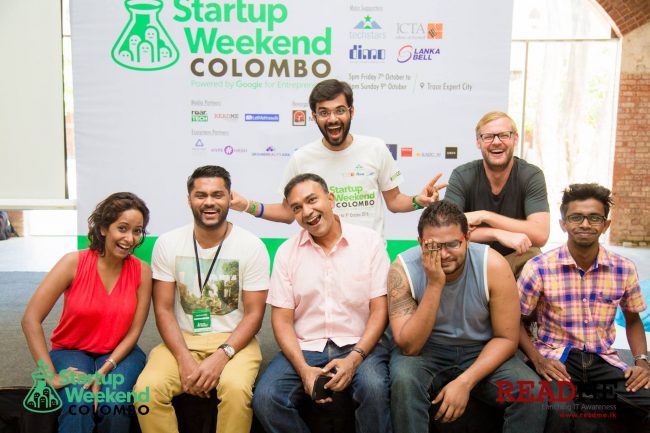
The organising team of Startup Weekend. Picture Courtesy: ReadMe
Featured image credit: ReadMe

